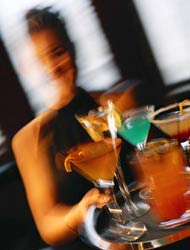Drug Turns Crime Victims Into Zombies
By Phil StewartBOGOTA, Colombia (Reuters) - The last thing Andrea Fernandez recalls before being drugged is holding her newborn baby on a Bogota city bus.
Police found her three days later, muttering to herself and wandering topless along the median strip of a busy highway. Her face was badly beaten and her son was gone.
Fernandez is just one of hundreds of victims every month who, according to Colombian hospitals, are temporarily turned into zombies by a home-grown drug called scopolamine which has been embraced by thieves and rapists.
"When I woke up in the hospital, I asked for my baby and nobody said anything. They just looked at me," Fernandez said, weeping. Police believe her son Diego was taken by a gang which traffics in infants.
Colorless, odorless and tasteless, scopolamine is slipped into drinks and sprinkled onto food. Victims become so docile that they have been known to help thieves rob their homes and empty their bank accounts. Women have been drugged repeatedly over days and gang-raped or rented out as prostitutes.
In the case of Fernandez, the mother of three was rendered submissive enough to surrender her youngest child.
Most troubling for police is the way the drug acts on the brain. Since scopolamine completely blocks the formation of memories, unlike most date-rape drugs used in the United States and elsewhere, it is usually impossible for victims to ever identify their aggressors.
"When a patient (of U.S. date-rape drugs) is under hypnosis, he or she usually recalls what happened. But with scopolamine, this isn't possible because the memory was never recorded," said Dr. Camilo Uribe, the world's leading expert on the drug.
Scopolamine has a long, dark history in Colombia dating back to before the Spanish conquest.
Legend has it that Colombian Indian tribes used the drug to bury alive the wives and slaves of fallen chiefs, so that they would quietly accompany their masters into the afterworld.
Nazi "angel of death" Joseph Mengele experimented on scopolamine as an interrogation drug. And scopolamine's sedative and amnesia-producing qualities were used by mothers in the early 20th century to help them through childbirth.
Finding the drug in Colombia these days is not hard.
The tree which naturally produces scopolamine grows wild around the capital and is so famous in the countryside that mothers warn their children not to fall asleep below its yellow and white flowers. The tree is popularly known as the "borrachero," or "get-you-drunk," and the pollen alone is said to conjure up strange dreams.
"We probably should put some sort of fence up," jokes biologist Gustavo Morales at Bogota's botanical gardens, eyeing children playing with borrachero seeds everywhere.
"If you ate a few of those, it would kill you."
Although scopolamine can be easily extracted from the seeds, experienced criminals hardly ever bother with them, police say.
Pure, cheap scopolamine is brought across the border from neighboring Ecuador, where the borrachero tree is harvested for medical purposes, Uribe said. The alkaloid is used legally in medicines across the world to treat everything from motion sickness to the tremors of Parkinson's disease.
The use of scopolamine by criminals appears to be confined to Colombia, at least for now, and it's not clear why the drug is such a rampant problem in Colombia. Some analysts blame it on a culture of crime in the Andean nation, home to the world's largest kidnapping and cocaine industries, not to mention Latin America's longest-running guerrilla war.
There are so many scopolamine cases that they usually don't make the news unless particularly bizarre. One such incident involved three young Bogota women who preyed on men by smearing the drug on their breasts and luring their victims to take a lick.
Losing all willpower, the men readily gave up their bank access codes. The breast-temptress thieves then held them hostage for days while draining their accounts.
The U.S. Embassy in Bogota takes scopolamine very seriously and offers staff tips on how avoid being drugged. One piece of advice may seem obvious: Don't let your drinks out of your sight when at a Bogota bar or nightclub.
Still, at least three visiting U.S. government employees here have been drugged and robbed over the past two years. Other American victims from time to time appear at the embassy seeking help, still shaking off a scopolamine hangover.
"I remember one case, an American reported being drugged," an embassy official said. "He says to his doorman 'Why did you let them walk out with my stuff.' The doorman says, 'Because you told me to.'"
'Colombian Devil's Breath'
(video: wmv; 591Kb)
Refs
and further readingHOME
Colombia
Burundanga
Scopolamine
Anticholinergics
Just For Chemists
The Abolitionist Project
Scopolamine: structure
Scopolamine as an antidepressant

